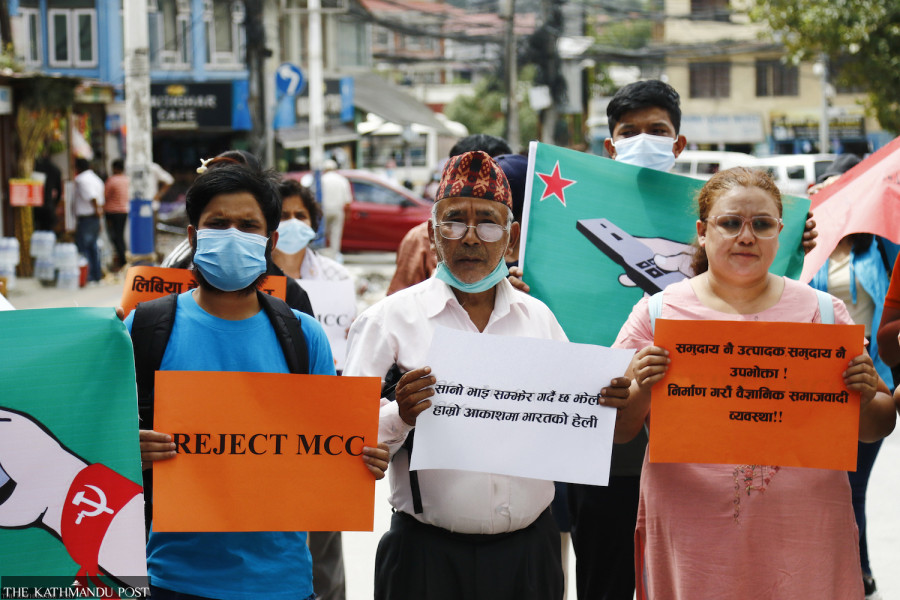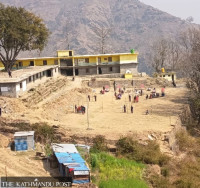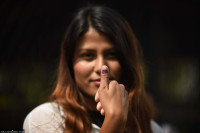National
Nepal government’s attempts to curb protests, debates draw public ire
Home Ministry’s two statements in three days warning of actions over activities against ‘friendly nations’ amount to curtailing of fundamental rights, analysts and leaders say.
Tika R Pradhan
During the 2017 elections, the Nepali Congress did not have a clear agenda as such.
Congress President Sher Bahadur Deuba mostly spent his time vilifying the communist alliance of the CPN-UML and the Communist Party of Nepal (Maoist Centre). One of the common refrains he made from the hustings was—if communists were voted to power, people may not even get a chance to cry properly, indicating at the possible threat that citizens’ rights would be heavily curtailed.
People, however, voted for the communists. Congress faced a historic drubbing. KP Sharma Oli, who was elected prime minister with a strong mandate, did engage in some adventures which later grew out of proportions to the extent of undermining the constitution.
But as they say politics is a game of immense possibilities, Oli could not govern for the full five-year term. Despite suffering a massive loss in the elections, Deuba returned to power three and a half years later.
Now, it is his government that appears to be attempting some moves that could be close to gag orders.
Caught in a diplomatic dilemma surrounding all its key allies, India, China and the United States, the Deuba government of late has been on a statement-issuing spree, with two such statements in the past three days. The statements carry veiled threats to the public against making public statements “related to friendly nations and projects being developed with assistance from friendly nations”.
On Sunday, the Home Ministry in a statement said that its attention has been drawn to some activities like protests and sloganeering against the prime minister of a neighbouring country and burning him in the effigy.
“The ministry has taken serious objection to such activities,” reads the statement.
The ministry has not mentioned the name of the prime minister, but it is apparent that the reference was to Narendra Modi of India.
On Friday also, the Home Ministry in a statement warned people against making any negative comments about development projects supported by friendly nations, employees working in such projects, foreign nationals and their properties.
The statement came just as controversy over the Millennium Challenge Corporation (MCC) Nepal compact grew.
The MCC compact is an American programme, which was signed by Nepal and the United States in 2017, under which Nepal would receive $500 million in grants to be used in the electricity transmission and road projects.
Observers and rights activists say public debates and discourses on various issues are natural in a democracy and a democratic government should focus on dealing with such matters rather than warning the citizens of consequences. The Deuba government has resorted to threatening the people to cover up its inaction and inability to protect its citizens, according to them.
“It’s an extremely irresponsible act on the part of the government to threaten the people who are demanding that it protect its citizens,” said Charan Prasai, a human rights activist. “Even from the human rights angle, such a statement violates people’s right to protest.”
The ministry’s Sunday statement follows Friday’s protest by the All Nepal National Free Students’ Union, a sister organisation of the CPN (Unified Socialist), a coalition partner in the Deuba government. The protesters burnt the Indian prime minister in effigy while calling out the Nepal government over its silence over a youth’s disappearance into the Mahakali river and Indian helicopters encroaching on Nepali airspace in Darchula region.
Jaya Singh Dhami, 33, from Khangdang Mal of Byas Rural Municipality-2 in Darchula, fell into the Mahakali while crossing the river using an improvised cable crossing, locally known as tuin. Media reports based on eyewitness accounts suggested that a member of India’s Sashastra Seema Bal (SSB) had untied the cable just when Dhami was about to reach the Indian side, across the river.
A probe team formed by the government suggested that the incident took place “in the presence of” the Indian security personnel.
After the probe report was submitted to Home Minister Bal Krishna Khand last week, the ministry on Thursday wrote to the Ministry of Foreign Affairs to take diplomatic initiatives with India to find out the truth about the incident and bring the culprit(s) to book.
The same day, India said that it was unaware of any such incident in Darchula and any investigation by Nepal. “We have heard from the media, but we don’t have any official information on the matter from the Nepal government,” Arindam Bagachi, spokesperson for India’s Ministry of External Affairs, said during a regular press briefing on Thursday.
The Deuba government’s failure to demonstrate urgency to take up the July 30 incident with India has created quite an uproar in Kathmandu.
Then last week, Kantipur, the Post’s sister paper, reported that Indian helicopters were flying in the Nepali skies and the Nepal government had failed to take up the sensitive issue with Delhi. Many were quick to criticise the Deuba government’s “timidity” and failure to stand up to what they called “Indian high-handedness”.
In its statement on Sunday, the Home Ministry has said that Nepal wants to further strengthen the country’s relationship with friendly countries and is committed to not allowing any activities against any of the countries.
“We request everyone not to carry out any activities that could affect the dignity and independence of our friendly nations,” states the statement.
The ministry has also said that the government has been resolving bilateral issues through dialogue and diplomatic channels and that a similar process would be followed in the future as well.
“We would like to inform that all the activities against our friendly nations would be restricted and action would be taken against anyone involved in such activities of taking the law into one’s hands,” the ministry has warned.
“If the government had taken the Darcula incident up with the Indian government promptly, there would not have been any protests on the streets and social media,” said Prasai.
According to Prasai, both the statements on Friday and Sunday show that the incumbent government does not believe in democratic values, as it appears to be trying to curb the people’s fundamental rights.
In recent months, the MCC has become a lightning rod for criticism, with many questioning the American intent for providing it to Nepal and the need for the parliamentary ratification of the programme. Those opposing the MCC say this is part of Washington’s Indo-Pacific Strategy and signing up to the programme would put Nepal under the US security umbrella. Detractors also argue that some of the points in the MCC agreement undermine Nepal’s sovereignty.
When Nepal signed the agreement in 2017, Deuba was the prime minister. The MCC bill has been pending in Parliament since 2019 largely due to differences between political parties.
After Deuba’s return to power in July this year, just as his government was making preparations to get the MCC through Parliament, the controversy surrounding it has raised its head again. Deuba’s coalition partners also have been expressing their reservations about its endorsement without making some amendments.
Such controversies over the US programme have put Deuba in a fix, as MCC officials are due to visit Nepal on Thursday. Parliament is set to resume its new session from Wednesday.
The Home Ministry statement on Friday was aimed at quelling protests against the MCC and growing negative debates on it.
“Nepal government’s serious attention has been drawn to the direct and indirect comments and threatening statements, made on various media platforms and social media, against development projects run with the support of friendly nations, against their employees, foreign nationals and their properties in recent days,” read the statement signed by Phanindra Mani Pokharel, spokesperson for the Home Ministry.
The ministry has requested everyone not to indulge in any activities that would threaten implementation of development projects and affect relationships with friendly nations.
“The ministry is monitoring such activities and statements and analysing them minutely,” said the ministry. “Stern action will be taken as per the existing law against those carrying out such activities.”
Daman Nath Dhungana, a former House Speaker, said the government cannot restrict people from holding public debates and protests.
“Such statements do not suit a democratic government like this,” Dhunagana told the Post. “In a democracy, a government is accountable to the people and it is answerable to the people. Instead of showing its accountability to the public, it is trying to quell their voices.”
Dhungana, however, said the protesters should also be responsible and sensitive on foreign and security issues, even though their right to protest has been guaranteed by the constitution.
According to Dhungana, what is worrying in Nepal of late is that society is becoming more and more irresponsible.
“There seems to be restlessness, dissatisfaction and anger,” said Dhungana. “And this is reflected everywhere… on the streets, on social media.”
When reached for comments on the statements, Home Minister Bal Krishna Khand refused to speak.
Narayan Kaji Shrestha, spokesperson for the CPN (Maoist Centre) too declined to comment.
Leelamani Pokhrel, a Standing Committee member of the Maoist Centre, however, called the Home Ministry statements illegal and unconstitutional.
“Can a government stifle people’s right to expression?” said Pokhrel, a vocal critic of the MCC. “Can the government stop people from protesting... that too on an issue that is directly linked to national interests and sovereignty?”
Pokhrel even challenged the government, which is backed by his own party, to initiate action against him, saying, “I won’t stop criticising and protesting against any moves that would undermine our national interest and sovereignty.”
Whether the MCC undermines Nepal’s sovereignty, however, continues to be a matter of debate among political parties, the intelligentsia and members of the public. The Finance Ministry has even written to the MCC headquarters, listing at least 11 questions, which it has called concerns raised in the public sphere.
Gagan Thapa, a Congress lawmaker, said any attempt to curtail people’s right to expression and protest is not acceptable regardless of which government is in power.
“We had raised similar issues yesterday [during the Oli government]. Similar attempts by our government are not acceptable,” said Thapa. “Freedom of expression and people’s right to protest have been guaranteed by the constitution. If there is anything against the law, the government can take action. There is no need to incite people unnecessarily.”




 27.41°C Kathmandu
27.41°C Kathmandu














